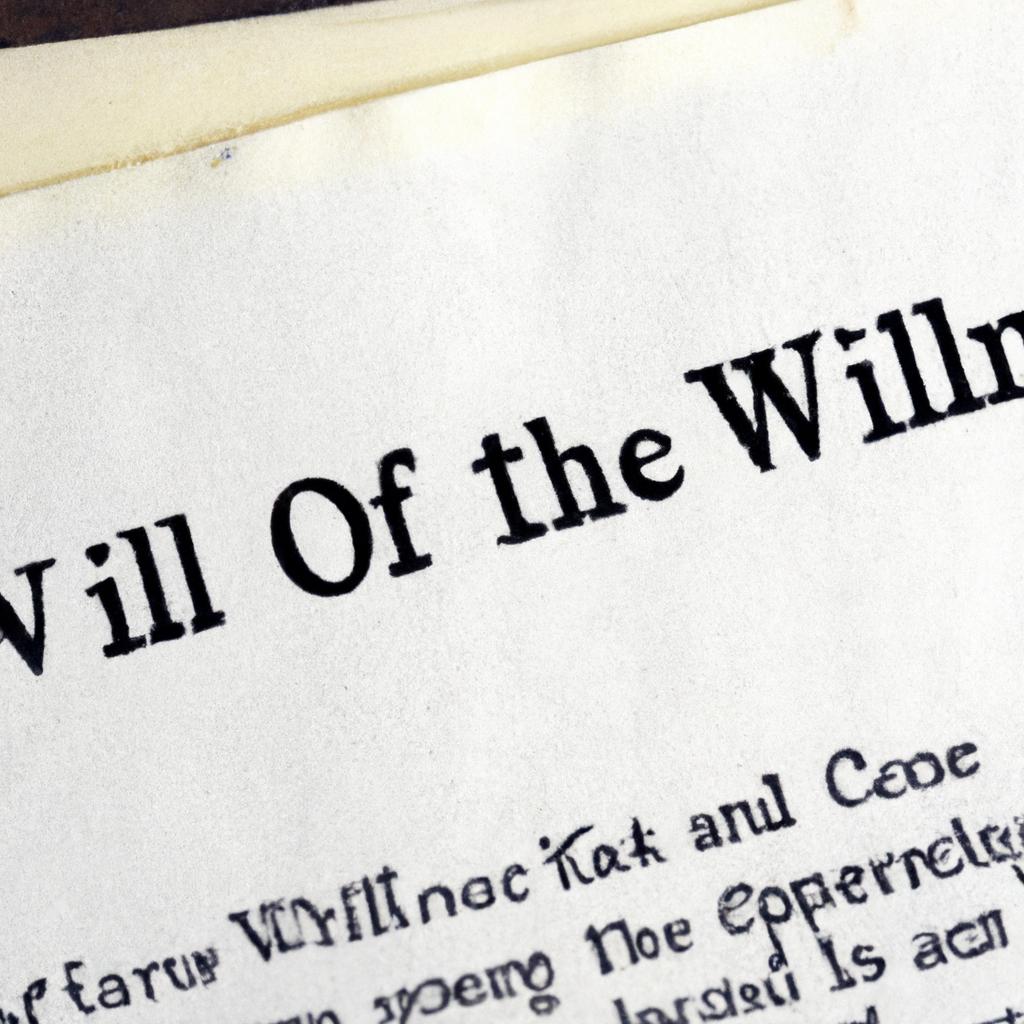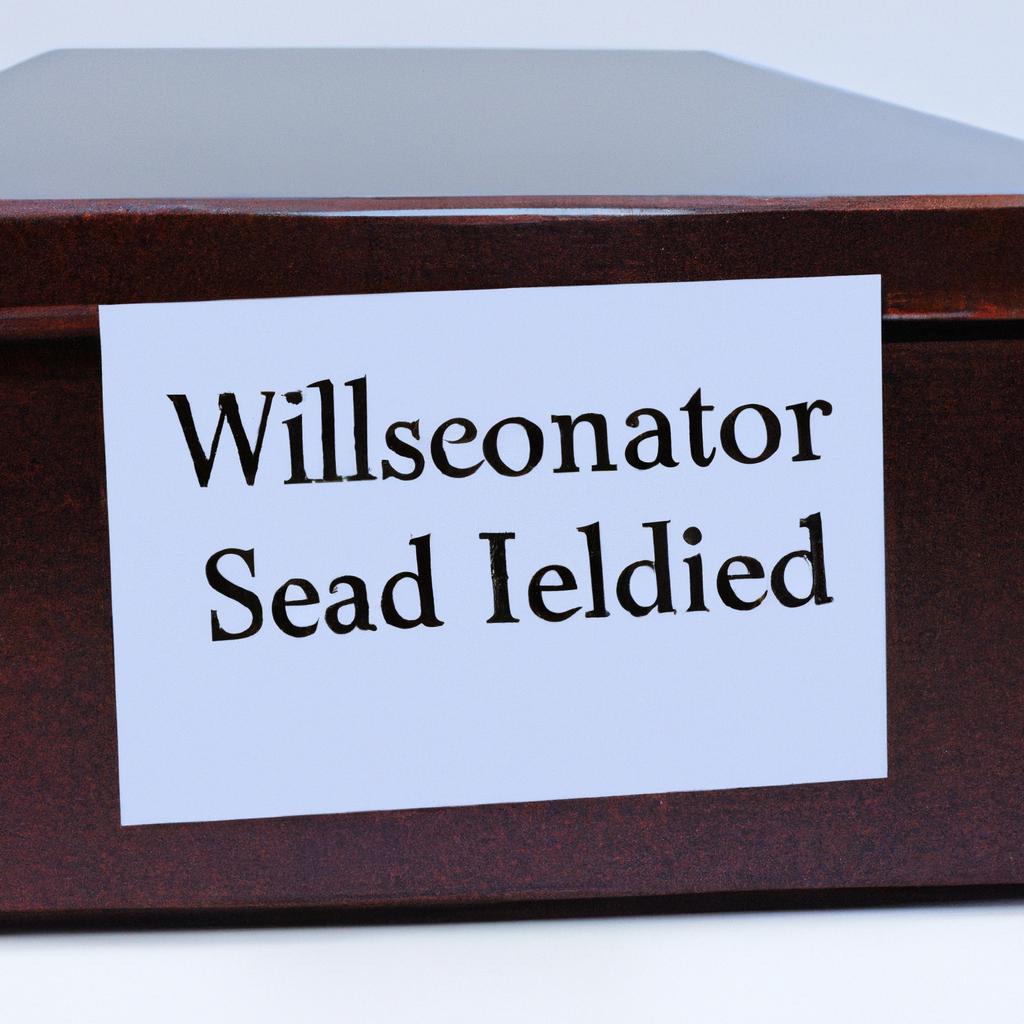In the intricate realm of estate planning, the question of where the original copy of a will is kept often arises. As seasoned practitioners of the law at Morgan Legal Group in New York City, we understand the importance of clarity and precision in matters of inheritance. Join us as we delve into the crucial role of safeguarding the original will and explore the legal obligations surrounding its custody.
Custody of the Original Will Document
Your original will document is a crucial legal instrument that outlines your wishes for the distribution of your assets after your passing. It is essential to store this document in a safe and secure location to ensure that it is not misplaced or tampered with. The is a key consideration when planning your estate, as it determines who will have access to the document when it is needed.
When determining who should keep the original copy of your will, it is important to consider the following factors:
- The importance of keeping the document in a secure and fireproof location.
- The need to inform your executor or trusted family member about the location of the document.
- The option of storing the will with a trusted lawyer or in a safe deposit box.

Importance of Safeguarding the Original Will
When it comes to the , it is crucial to understand the significance of keeping this document secure and protected. The original copy of a will holds legal authority and validity, serving as the official record of a person’s final wishes and distribution of assets upon their passing. Without the original will, the estate may be subject to disputes, challenges, or potential fraud, leading to complications and delays in the probate process.
Typically, the original will is kept in a safe and secure location, such as a fireproof safe, safe deposit box, or with an attorney. It is recommended to inform trusted individuals, such as family members or executors, of the location of the original will. Additionally, copies of the will should be provided to relevant parties, such as beneficiaries and estate planning professionals. Safeguarding the original will ensures that the wishes of the deceased are carried out faithfully and efficiently, providing peace of mind and protection for all parties involved.

Recommendations for Secure Storage of a Will
When it comes to the secure storage of a will, it is crucial to ensure that the original copy is kept in a safe and accessible location. Many individuals wonder who should be entrusted with the responsibility of holding onto the original will. Here are some recommendations to consider:
<ul>
<li><b>Lawyer:</b> One option is to have your lawyer keep the original copy of your will. They can store it in a secure location and provide you with a copy for your records.</li>
<li><b>Safe Deposit Box:</b> Another option is to place the original will in a safe deposit box at a bank. This ensures that it is protected from theft, fire, or other disasters.</li>
<li><b>Family Member or Trusted Individual:</b> Some people choose to have a family member or trusted individual hold onto the original will. It is important to inform them of its location and ensure that they can access it when needed.</li>
</ul>Regardless of where you choose to store your original will, it is crucial to inform your executor or beneficiaries of its location. This will help ensure a smooth probate process and prevent any disputes or challenges to the validity of the will. Additionally, it is advisable to regularly review and update your will to reflect any changes in your circumstances or wishes.
<table class="wp-block-table">
<tr>
<th>Pros</th>
<th>Cons</th>
</tr>
<tr>
<td>Secure storage</td>
<td>Potential loss or damage</td>
</tr>
<tr>
<td>Accessible to executor</td>
<td>Risk of unauthorized access</td>
</tr>
</table>
Considerations for Choosing an Executor or Attorney to Hold the Original Will
When selecting an executor or attorney to hold the original will, there are several important considerations to keep in mind to ensure that your final wishes are carried out smoothly and efficiently. Below are some key factors to consider when choosing the right person for this important role:
Relationship to the testator: It is crucial to choose someone who is trustworthy, reliable, and capable of fulfilling the responsibilities of an executor or attorney. Consider selecting a close family member, a trusted friend, or a professional advisor who is familiar with your wishes and capable of handling complex legal and financial matters.
Q&A
Q: Who typically holds the original copy of a will?
A: The original copy of a will is usually held by the person who made the will, also known as the testator.
Q: Can someone else hold the original copy of a will?
A: Yes, it is possible for someone else to hold the original copy of a will, such as a lawyer or a trusted family member.
Q: Why is it important to keep the original copy of a will safe?
A: Keeping the original copy of a will safe is important to ensure that the wishes of the testator are followed and to prevent any disputes or challenges to the will.
Q: What should be done if the original copy of a will is lost or damaged?
A: If the original copy of a will is lost or damaged, it is recommended to create a new will or execute a codicil to make any necessary changes.
Q: Can a copy of a will be used if the original is lost?
A: In some cases, a copy of a will may be accepted by the court if the original cannot be located, but it is always best to keep the original copy safe.
Concluding Remarks
In conclusion, it is essential to understand the importance of keeping the original copy of a will in a safe and secure location. Whether it is stored with the testator, their attorney, or in a safe deposit box, ensuring that the original document is readily accessible when needed is crucial for a smooth and efficient administration of the estate. By taking the necessary steps to safeguard the original will, individuals can provide peace of mind for themselves and their loved ones in the future. Remember, a will is a valuable document that outlines your final wishes, so it is vital to keep it protected and easily accessible for those who will be responsible for carrying out your wishes.
 Who Keeps the Original Copy of a Will?
Who Keeps the Original Copy of a Will?
A will is a legal document that outlines how a person’s assets and belongings should be distributed after their death. It is an essential document for individuals who want to ensure that their wishes are carried out and their loved ones are taken care of after their passing. However, one question that often arises is, “who keeps the original copy of a will?” In this article, we will delve into the answer to this question and provide valuable information about wills and their storage.
Understanding the Basics of a Will
First, let’s start with the basics. A will, also known as a last will and testament, is a document that dictates the distribution of a person’s assets and belongings after their death. It is a legally binding document, and in most cases, it must go through the probate process, which is the legal process of validating a will and distributing assets according to its terms.
A will can also include important information such as who will be the guardian of any minor children, who will handle the distribution of assets, and any specific funeral or burial wishes. It is a crucial document for individuals who want to have control over what happens to their assets and loved ones after they pass away.
Who Should Have a Will?
Anyone who has assets and wishes to control how they are distributed should have a will. This includes individuals with children, property, investments, or any other valuable possessions. Without a will, the state’s laws will dictate how assets are distributed, which may not align with the individual’s wishes.
Creating a will is a responsible and proactive way to ensure that one’s loved ones are taken care of and their assets are distributed according to their wishes. It also provides a sense of peace and control for the individual, knowing that their affairs will be handled as per their desires, even after they are no longer with us.
Who Drafts a Will?
A will can be drafted by anyone who is of sound mind and legal age. It is most commonly created by an attorney, but it is possible to create a will through online resources or even handwritten, known as a holographic will. However, it is always recommended to have an attorney draft a will to ensure that it is valid and follows all necessary legal requirements.
After the will is drafted and signed, it must be witnessed by two individuals who are not named as beneficiaries in the will. These witnesses must also sign the will for it to be considered valid.
Once the will is finalized, the question remains, who keeps the original copy?
Who Keeps the Original Copy of a Will?
The original copy of a will should always be kept in a safe and secure place. It is recommended to keep the original in a fireproof and waterproof box, bank safe deposit box, or with an attorney or executor of the will. Having the original copy is crucial as it is the only legally binding document and must be presented during the probate process.
In cases where the will is kept with an attorney or executor, copies should be given to the appropriate beneficiaries and family members. This provides peace of mind for the individual, knowing that their wishes are in safe hands, and their loved ones are aware of their arrangements.
If the original copy is lost or destroyed, it will be challenging to prove the validity of the will, and the state’s laws will take effect in distributing assets. It is also essential to update the will regularly and keep it in a safe place to ensure that it accurately reflects the individual’s current wishes.
Benefits of Having a Will
Having a valid will can provide numerous benefits for the creator and their loved ones. Some of these benefits include:
1. Control over asset distribution: A will gives the individual full control over how their assets are divided, preventing any potential disputes between family members.
2. Protection for minor children: A will allows individuals to name a guardian for their minor children, ensuring that they will be taken care of according to their wishes.
3. Avoiding probate delays: With a will, assets can be distributed much quicker and smoother, avoiding potential delays and legal complications.
4. Saves money: A will helps to minimize the costs associated with probate and can reduce potential court fees and legal expenses.
Practical Tips for Storing a Will
To ensure that a will is safe and easily accessible in case of the individual’s death, here are some practical tips for storing it:
1. Use a secure location: The original copy should be kept in a secure and safe location to avoid any potential damage or theft.
2. Inform the executor: The executor of the will should be informed about the location of the original will, so they can present it during the probate process.
3. Keep copies: Make multiple copies of the will and give them to close family members and beneficiaries to ensure its safety and accessibility.
4. Update regularly: Review the will regularly and make necessary updates to reflect any changes in assets, beneficiaries, or wishes.
In Conclusion
In summary, a will is an important legal document that should be carefully drafted, stored, and regularly updated. The original copy of the will should be kept in a secure location, such as a bank safe deposit box or with an attorney, while copies should be given to appropriate family members and beneficiaries. Having a valid will provides peace of mind and ensures that the individual’s wishes are carried out after their passing. So, whether you have a will or are considering drafting one, be sure to keep the original copy in a safe place to protect its legality and ensure your final wishes are fulfilled.












